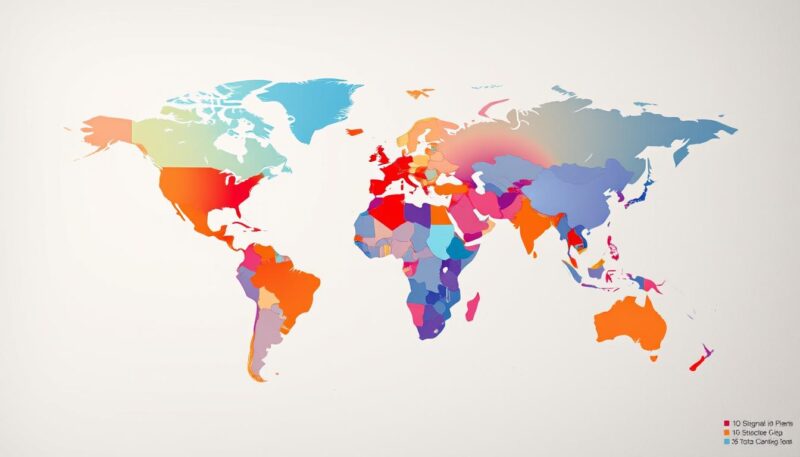Did you know that the global average IQ is around 82.12, but some nations fall significantly below this benchmark? In 2025, Nepal stands out as the country with the lowest average IQ, scoring approximately 42.99. This striking statistic raises important questions about the factors influencing cognitive abilities worldwide.
IQ, or intelligence quotient, is a standardized measure of human intelligence. The average global IQ is set at 100, with most countries clustering around this number. However, socio-economic challenges, education quality, and living conditions play a crucial role in determining IQ scores.
Nepal’s average IQ of 42.99 highlights the impact of limited access to education and widespread poverty. According to data from sources like the World Population Review, factors such as malnutrition, inadequate healthcare, and poor education systems significantly contribute to lower cognitive abilities. These challenges are not unique to Nepal, as other countries like Liberia and Sierra Leone also face similar issues, with average IQ scores of 45.07.
Key Takeaways
- Nepal has the lowest average IQ in 2025, scoring approximately 42.99.
- Global average IQ is around 82.12, with most countries near this benchmark.
- Education and living conditions significantly influence IQ scores.
- Liberia and Sierra Leone follow Nepal, with average IQs of 45.07.
- Poverty, malnutrition, and limited healthcare access contribute to lower IQ levels.
Understanding IQ and Its Measurement
Intelligence Quotient, commonly known as IQ, is a measure used to measure human intelligence. It assesses various cognitive abilities such as reasoning, problem-solving, and thinking. IQ tests are standardized to ensure consistency in measurement across different populations.
Defining the Intelligence Quotient
The Intelligence Quotient is calculated by comparing the chronological age to the mental age. It is expressed as a quotient: 100 times the ratio of mental age to chronological age. An average IQ score is 100, with most people scoring between 85 to 115. Scores below 70 indicate a lower cognitive ability, while scores above 130 are considered highly gifted.
Historical Context and Testing Methods
IQ testing has evolved significantly over the years. Early tests were often biased towards Western education and cultural norms, which skewed results from diverse populations. Civil wars and political instability in some countries disrupted education systems, further affecting IQ scores. For example, in countries like Liberia and Sierra Leone, the impact of civil war on education and healthcare systems has been linked to lower average IQ scores.
Access to education and healthcare plays a critical role in IQ measurement. In many developing nations, limited access to quality education and healthcare services can lead to lower IQ scores. This emphasizes the importance of considering the socio-economic context when interpreting IQ results.
IQ scores can be influenced by various factors, including cultural background and access to resources. Therefore, it’s crucial to consider the broader context when analyzing IQ data across different countries.
For more insights into global intelligence trends, you can explore this resource on global intelligence studies.
Global Data on National IQ Scores
Global IQ data reveals significant disparities across nations, with certain countries facing challenges that impact cognitive development. According to recent studies, the top 10 countries with the lowest IQ scores are predominantly those grappling with poverty and underdeveloped education systems.
Insights from the World Population Review
Research indicates that nations like Nepal, Liberia, and Sierra Leone are at the forefront of this challenge. These countries not only face economic hardships but also struggle with limited access to quality education and healthcare. For instance, Nepal’s literacy rate stands at 64.66%, while Liberia and Sierra Leone have literacy rates of 47.62% and 48.51%, respectively. These factors significantly contribute to lower average IQ scores.
Recent Research and Statistical Trends
Statistical trends show a correlation between conflict and lower IQ scores. Countries affected by war, such as Liberia and Sierra Leone, often experience disrupted education systems and poor healthcare, which can hinder cognitive development. Additionally, limited resources and infrastructural challenges further exacerbate these issues, leading to a cycle of poverty and low educational outcomes.

These findings underscore the need for comprehensive strategies to address poverty, improve education systems, and enhance healthcare access to foster cognitive development and raise IQ levels globally.
Factors Contributing to Low IQ Levels
Poverty, malnutrition, and limited access to essential resources significantly influence cognitive abilities across various populations. These factors are particularly evident in countries facing socio-economic challenges, where the lack of adequate nutrition and healthcare exacerbates cognitive development issues.
Poverty, Malnutrition, and Resource Limitations
Poverty is a critical factor in determining national IQ scores. In Liberia, for instance, widespread poverty limits access to nutritious food and educational resources, directly impacting cognitive development. Malnutrition, especially in early childhood, can hinder brain development, leading to lower IQ scores. A study highlighted that malnutrition affects children’s ability to learn and perform cognitive tasks, further emphasizing the need for adequate nutrition in developmental years.
The Role of Healthcare and Environmental Challenges
Limited access to quality healthcare and environmental challenges also play a significant role in cognitive development. In Liberia, poor healthcare services and environmental factors contribute to lower IQ scores. The lack of proper medical care and exposure to harmful environmental elements can impede cognitive growth, making it challenging for individuals to reach their full potential.
| Factor | Impact on Cognitive Development | Example (Liberia) |
|---|---|---|
| Poverty | Reduces access to education and nutrition | High poverty rates limit resources for schools and healthcare |
| Malnutrition | Hinders brain development in children | Prevalence of stunted growth due to inadequate diet |
| Limited Healthcare | Increases cognitive development challenges | Inadequate medical facilities and access to care |
“Malnutrition in early childhood can lead to irreversible cognitive impairments, affecting a child’s ability to learn and succeed in school,” notes a recent study on global cognitive development.
These elements collectively create a challenging environment for cognitive growth, particularly in Liberia, where socio-economic challenges are prevalent. Addressing these issues is essential for improving national IQ scores and fostering better cognitive development.
what country has the lowest iq 2025
Nepal holds the distinction of having the lowest average IQ score globally in 2025, with a striking average of 42.99. This figure underscores the significant impact of socio-economic challenges on cognitive development.
Nepal’s Record-Low Average IQ
The primary factors contributing to Nepal’s low IQ score include limited access to quality education and healthcare. These challenges are compounded by widespread poverty and malnutrition, particularly in rural areas. The lack of resources and infrastructure further hinders cognitive growth, creating a cycle of developmental delays.
Comparative Analysis with Other Nations
While Nepal ranks lowest, other countries like Liberia and Sierra Leone also face similar struggles, with average IQ scores of 45.07. These nations share common challenges, including inadequate education systems and poor healthcare access. However, Nepal’s situation is exacerbated by a large and vulnerable population, which stretches limited resources even thinner.

The interplay of population-related factors and educational shortcomings in Nepal highlights the need for targeted interventions. Addressing these issues is crucial for improving not only Nepal’s IQ scores but also the cognitive development of its future generations.
Socio-Economic and Cultural Influences on Cognitive Development
Socio-economic and cultural factors significantly shape cognitive development worldwide. These elements influence access to education, healthcare, and nutrition, which are critical for intellectual growth. Understanding these dynamics helps address disparities in global intelligence levels.
Impact of Political Instability and Conflict
Political instability disrupts education and healthcare systems, affecting cognitive development. Sierra Leone, for instance, faced over a decade of civil war, leading to a 48.51% literacy rate. This instability limits access to quality education, a key factor in lower IQ scores. Studies show that conflict hinders brain development in children, particularly in regions with prolonged instability.
Cultural Attitudes Toward Education and Development
Cultural attitudes toward education vary globally, influencing cognitive outcomes. In some regions, education is less prioritized, leading to lower literacy rates and limited opportunities for cognitive growth. For example, Sierra Leone’s cultural context often prioritizes vocational skills over formal education, affecting national intelligence levels.
| Factor | Impact on Cognitive Development | Example (Sierra Leone) |
|---|---|---|
| Political Instability | Disrupts education and healthcare systems | Over a decade of civil war led to a 48.51% literacy rate |
| Cultural Attitudes | Influence prioritization of education | Emphasis on vocational skills over formal education |
| Quality Education | Shapes cognitive growth opportunities | Lack of access to quality education |
“Cultural attitudes and political stability are cornerstone elements in shaping a nation’s cognitive development landscape.”
These factors underscore the global nature of cognitive development challenges, necessitating comprehensive strategies to enhance education and stability worldwide.
Country-Specific Profiles and Analysis
National IQ scores reveal distinct challenges across different regions. This section examines the unique circumstances of countries like Nepal, Liberia, and Sierra Leone, while also exploring additional case studies from Guatemala, The Gambia, and Nicaragua.
Overview of Key Countries
Nepal, Liberia, and Sierra Leone face severe developmental challenges that impact cognitive development. Nepal’s literacy rate of 64.66% reflects limited educational access, exacerbated by poverty and malnutrition. Similarly, Liberia and Sierra Leone struggle with literacy rates of 47.62% and 48.51%, respectively, due to civil wars disrupting education systems and healthcare access.
Additional Case Studies
Guatemala, The Gambia, and Nicaragua present varied socio-economic impacts. Guatemala’s malnutrition rates affect cognitive development, while The Gambia’s cultural emphasis on vocational skills over formal education influences IQ scores. Nicaragua’s political instability and resource limitations further hinder development.
These nations highlight the need for targeted interventions to address malnutrition, improve education, and enhance healthcare, essential for fostering cognitive growth and raising IQ levels globally.
Educational Systems and Their Impact on National IQ
Educational systems play a pivotal role in shaping national IQ scores, as they directly influence cognitive development and intellectual growth. The quality of schooling and the resources available to each child significantly impact intelligence outcomes, creating a foundation for future cognitive abilities.
Access to Quality Education and Learning Resources
Disparities in educational systems are evident across the globe, with countries like Guinea and The Gambia facing significant challenges. In Guinea, over 40% of children under five are underweight, which hinders brain development. Similarly, The Gambia struggles with limited access to quality education, affecting long-term cognitive growth. These nations highlight how poor infrastructure and resource scarcity can lead to lower IQ scores.
Innovative Reforms and Global Comparisons
Innovative educational reforms have shown promise in improving access to quality education. For instance, some regions have implemented digital learning platforms to reach remote areas. Global comparisons reveal that nations investing in education often see higher IQ scores. However, systemic challenges in Guinea and The Gambia persist, underscoring the need for targeted interventions.
| Country | Challenges | Impact on IQ |
|---|---|---|
| Guinea | Malnutrition, poor infrastructure | Significant cognitive delays |
| The Gambia | Limited resources, cultural attitudes | Lower national IQ scores |
Addressing these educational challenges is crucial for fostering cognitive growth and raising national IQ levels. By implementing policies that improve access to quality education and nutrition, countries can create a stronger foundation for future generations.
Policy Implications and Development Challenges
Policymakers face significant challenges in addressing the disparities in cognitive development highlighted by low average IQ scores. The data underscores the need for comprehensive strategies to overcome educational and healthcare barriers.
Strategies to Overcome Educational and Health Barriers
- Investing in healthcare infrastructure to improve access to essential services.
- Enhancing education systems through resource allocation and teacher training.
- Implementing nutrition programs to address malnutrition, particularly in early childhood.
Future Initiatives for Cognitive Development
Future initiatives should focus on sustainable development programs. For instance, Sierra Leone has shown progress through community-based education initiatives. These efforts highlight the importance of aligning policies with local needs.
“Addressing cognitive development challenges requires a multifaceted approach that combines education, healthcare, and economic policies.”
By reallocating resources and prioritizing education, nations can work towards improving average scores and fostering cognitive growth.
Conclusion
In conclusion, the analysis of global IQ scores highlights the complex interplay of factors influencing cognitive development. Challenges such as limited access to education, inadequate nutrition, and systemic healthcare issues are pivotal in determining national IQ levels.
Guatemala, along with other nations, exemplifies how these challenges can impact cognitive outcomes. Despite these obstacles, targeted reforms and investments in education and healthcare offer a pathway to improvement.
Addressing factors like nutrition and education quality is essential for enhancing future IQ scores. A holistic approach, combining educational reforms, nutritional programs, and healthcare improvements, is crucial for fostering long-term cognitive and developmental growth globally.
FAQ
Which countries are most affected by low IQ scores in 2025?
Countries such as Nepal, Sierra Leone, Liberia, Guatemala, The Gambia, Guinea, and Nicaragua face significant challenges related to low IQ scores due to factors like limited access to education and healthcare.
How does poverty impact cognitive development in these nations?
Poverty often leads to malnutrition and reduced access to quality education, directly affecting cognitive development and IQ levels in countries like Sierra Leone and Liberia.
What role does healthcare play in IQ levels?
Inadequate healthcare systems in countries such as Guinea and Nicaragua contribute to higher rates of malnutrition and untreated illnesses, which can hinder cognitive development and lower IQ scores.
How do civil wars influence national IQ averages?
Civil wars disrupt education systems and exacerbate poverty, as seen in Sierra Leone and Liberia, leading to lower IQ averages due to reduced access to resources and learning opportunities.
Can improving education systems raise IQ levels?
Yes, enhancing education quality and access, as seen in emerging reforms in Nepal and Guatemala, can significantly improve cognitive development and IQ scores over time.

